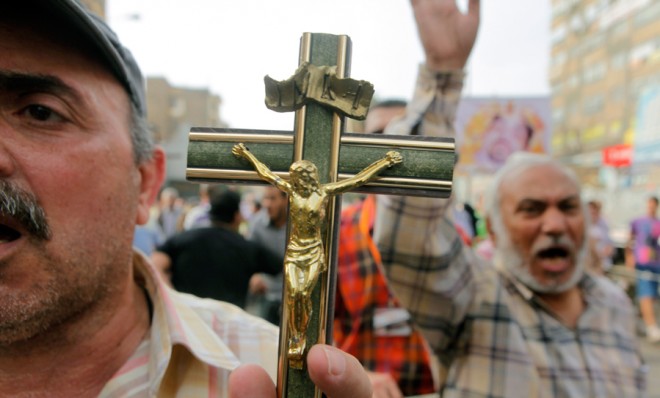Dispatch from Cairo: The disturbing rise of anti-Christian violence
The Egyptian military has no ideological problem with Christians, but they will not tolerate any activism from this community either

A free daily email with the biggest news stories of the day – and the best features from TheWeek.com
You are now subscribed
Your newsletter sign-up was successful
CAIRO, EGYPT — This country is nothing if not deeply polarized. And despite the rhetoric on both sides, neither the loyalists, who still support ousted Islamist President Mohamed Morsi, nor those who back the military intervention have a clear mandate to move forward.
One thing is for sure though: While those turning out to support Morsi are almost exclusively Muslims, the crowds at the military-sponsored demonstrations are much less religiously homogeneous. Still, it is hard to miss the surfeit of people wearing crucifixes and bearing traditional Coptic Christian tattoos milling about in Tahrir Square and outside the presidential palace, areas that have been occupied by anti-Morsi demonstrators.
The Coptic pope has long been a vocal opponent of Morsi and joined with many established Muslim clerics in supporting the coup. Pictures of the pope and pro-military Muslim clerics are now everywhere in pro-military demonstrations, outnumbered only by pictures of newly ascendant Gen. Abdul Fattah al-Sisi.
The Week
Escape your echo chamber. Get the facts behind the news, plus analysis from multiple perspectives.

Sign up for The Week's Free Newsletters
From our morning news briefing to a weekly Good News Newsletter, get the best of The Week delivered directly to your inbox.
From our morning news briefing to a weekly Good News Newsletter, get the best of The Week delivered directly to your inbox.
That members of the Christian minority indigenous to Egypt overwhelmingly support the ouster of an Islamist president probably surprises no one, and most Copts I know were loudly advocating a military takeover months before it became fashionable to do so. However, in their haste to get rid of the Islamists, it seems that Christians here have given their support to a military establishment that is unable to protect them and historically has been as prone to anti-Christian violence as the Islamists.
Despite a long history of official religious persecution against Copts, most Egyptian Muslims are tolerant and accepting of their Christian neighbors, at least on a personal level.
Morsi tried to emphasize his own personal tolerance, but while he made some scattered overtures to the Coptic Christian community, he also made it clear that he was going to be a Muslim president who would lead Egypt on an Islamic path.
The traditional Islamic law that Morsi and his Muslim brothers ostensibly look to is somewhat schizophrenic when it comes to religious tolerance. On the one hand, Islam is the only Abrahamic religion that explicitly prohibits forced conversions and outright victimization of other faiths. However, traditional Islamic law generally demands that non-Muslims pay an extra tax, and prohibits them from prosthelytizing, joining the army, or having meaningful leadership roles outside their communities.
A free daily email with the biggest news stories of the day – and the best features from TheWeek.com
These days Christians are still subject to numerous restrictions in Egypt, but the tax and military ban have been gone for over a century. Most Christians in Egypt feared that Morsi would use his power to reinstate and expand these edicts and solidify their status as second-class citizens.
Whatever Morsi's broader plans, his administration was striking for its inability to get anything done, good or bad. But for Christians, the security forces here are not necessarily reliable partners either.
The old military regimes often cracked down on the church leadership and rank and file for a variety of reasons. In the last two decades, as inter-religious strife grew, the regime was often unwilling to protect Christian communities at the risk of seeming un-Islamic. Immediately after the last dictator, Hosni Mubarak, fell, the military took direct control of Egypt. During this time the military committed a number of atrocities against Muslims and Christians, including a particular heinous massacre in October 2011 when uniformed military personnel killed 28 Christians who were peacefully demonstrating against discrimination.
This massacre underlined that while the Egyptian military has no ideological problem with Christians, they will not tolerate any activism from their community.
Even after Morsi took control, it was the anti-Islamist police, rather than Muslim Brotherhood goons, who seemed to be behind the worst anti-Christian atrocities. But such was the Christian community's fear of Morsi, that the military was able to count on them for almost universal support.
While the military has a history of indifference or even hostility toward Christians, Islamists are increasingly portraying the coup as a Christian plot. Islamist protesters have been chanting "down with the rule of the pope" and there have been numerous attacks on Christians over the last couple weeks, apparently in retaliation for the coup, including a brutal beheading of a Christian man in northern Sinai that was quickly broadcast across the internet earlier this month.
While Christians certainly have stuck their necks out as a community to support the coup, it is unlikely that the military will repay this in kind.
Jake Lippincott earned a degree in Middle Eastern Studies at Hampshire College. He worked in Tunis during the popular uprising there, and is now based in Cairo.